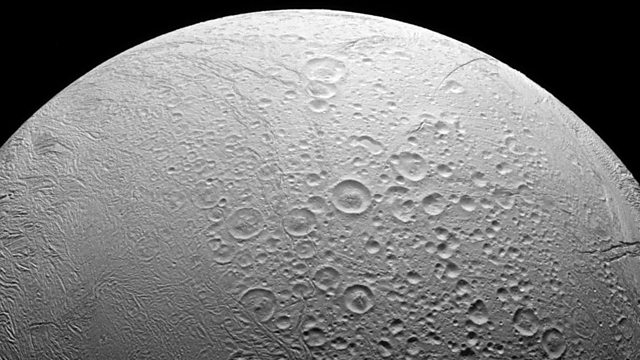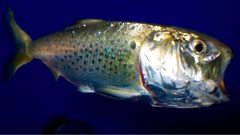Enceladus: Could this moon harbour life?
The Cassini spacecraft finds hydrogen on Saturn’s famous moon. Also, scientists use fish DNA to record their movements; how religious groups reconcile evolution and beliefs.
Hydrogen is a favourite food for some microorganisms, so finding it on one of Saturn’s moons, Enceladus, increases the potential for to it to have life. During its deepest-ever dive through the jets of water vapour and other materials bursting from cracks in the ice-covered surface of Enceladus, the Cassini spacecraft has detected enough hydrogen to sustain microbes much as it does in dark undersea environments on Earth.
And, while fish swim they shed DNA from their skin and faeces into the water. For the first time, scientists have been able to use this DNA to record fish moving through the rivers of New York. By doing this the scientists avoid the disturbance, and expense, of collecting fish from trawlers. Such ‘wildlife forensics’ is likely to spread to more and more corners of diversity surveying.
Lastly, we tackle one of the greatest disputes between science and religion – the theory of evolution. We explore how religious groups reconcile evolution with their beliefs and learn how the Muslim world is embracing – and rejecting – evolution depending on who holds political power.
Presenter: Adam Hart
Producer: Louisa Field
Image: The view looking toward the anti-Saturn hemisphere of Enceladus, 27 Nov 2016. Credit: NASA/JPL-Caltech/Space Science Institute
Last on
More episodes
Clip
-
![]()
Fishy dandruff
Duration: 00:39
Broadcasts
- Thu 13 Apr 2017 19:32GMT91�ȱ� World Service except News Internet
- Fri 14 Apr 2017 02:32GMT91�ȱ� World Service Americas and the Caribbean
- Fri 14 Apr 2017 04:32GMT91�ȱ� World Service Online, Australasia, Europe and the Middle East & UK DAB/Freeview only
- Fri 14 Apr 2017 05:32GMT91�ȱ� World Service South Asia
- Fri 14 Apr 2017 06:32GMT91�ȱ� World Service East and Southern Africa & East Asia only
- Fri 14 Apr 2017 13:32GMT91�ȱ� World Service Australasia
- Sun 16 Apr 2017 00:32GMT91�ȱ� World Service except News Internet
Podcast
-
![]()
Science In Action
The 91�ȱ� brings you all the week's science news.



